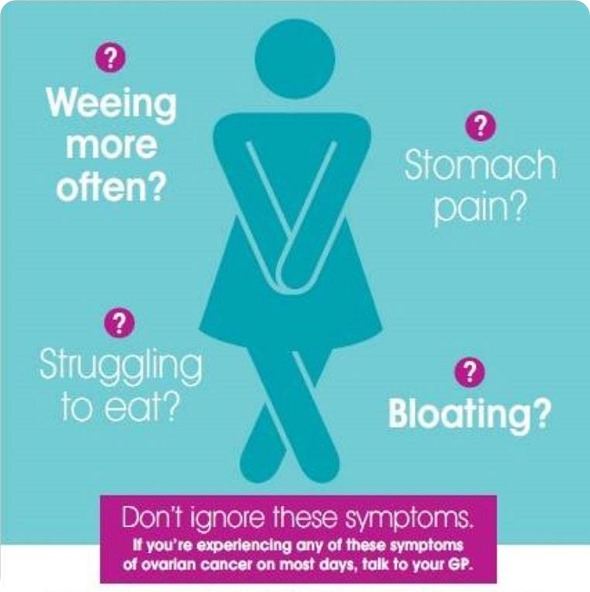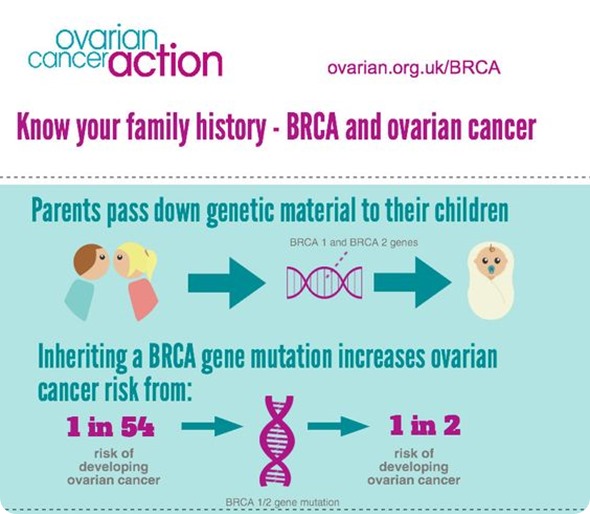Ovarian cancer affects around 7000 thousand women in the UK every year and very sadly the outcomes are not great. A women dies every 2 hours of ovarian cancer. If I am diagnosed today, I’ve only got a 40% chance of being alive in 5 years’ time.
For ovarian cancer awareness month, which takes place in March every year, we wanted to find out more about what women are really thinking about their healthcare and how confident they felt talking to their G.P.
We found some really interesting results, around a third of women felt they were unable to talk to their G.P about their physical, sexual and mental health and there may be a number of reasons for that but amongst the findings women were saying that they felt they couldn’t speak with authority and that they were feeling under confident about their symptoms.
That’s a very interesting finding and what we would say was actually being aware of the signs and symptoms of ovarian cancer is really important because if you have knowledge you can be empowered.
60% of our respondents told us that if they had information about their health they would feel more confident in going and speaking with their doctor. The message from us was: beware of the signs and symptoms of ovarian cancer, know what they are, keep a note of those symptoms in your diary and go and speak with your G.P if you have concerns.
What common symptoms should women be looking out for?
There used to be a myth that ovarian cancer didn’t have symptoms and we really keen to refute that to say that there are 4 really acute symptoms: persistent blotting, persistent tummy pain , need to pee more frequently and feeling full after you have eaten a meal, even if it’s just a small amount of food.

The important thing is that those are persistent and that they are unusual for you. Sadly, sometimes ovarian cancer gets misdiagnosed for irritable bowel syndrome but it is unusual that that may start at that particular time in a women’s life. Keep track of your symptoms and if they are unusual for you go to our website which is www.ovarian.org.uk
To keep track of your symptoms you can use an app on your phone or keep a paper copy and go along to your doctor and say “I’m having these symptoms, they are happening to me regularly and its unusual for me, I know that there is something that doesn’t feel right I need to have this checked out please” and what you should ask for is CA125 blood test.
What psychological difficulties do you think can accompany a diagnosis of ovarian cancer?
Well I think that there are a number of complications that can come with it, having the news that you are suffering from a life threatening illness can, of course affect your life in very many ways.
We know that women can sometimes feel very upset for themselves, worried about their families, and that the diagnosis can also affect their relationship with their partners, their friends and it can have an effect on your working life. There’s really no part of a women’s life that would remain untouched by a diagnosis of ovarian cancer.
It’s very important to have and seek support and also to seek information. I would also say that ovarian cancer in interesting because it can be inherited and women who are diagnosed with ovarian cancer should be offered a BRCA gene test as consequence.
There are two reasons for that subsequent test, one is that it can make a difference to that individual’s treatment path but it’s also really important information for their families’ as well. I think there is a psychological issue bound up with that, women can feel incredibly guilty that they have this gene that they may of passed on to their children.

Of course it’s not their fault it’s something that is innate, we all have a genetic inheritance, there are lots of different diseases that can have a genetic footprint and nobody should feel they are at fault or to blame but rather that if you have knowledge there are choices you can make.
How are these issues being tackled within the health service? Is this sufficient?
We all know that the health service is under enormous pressure at the moment, and that there are cuts going on in very many areas, and any disease can be impacted by that.
Ovarian cancer is one of many that may be affected by those issues. From my experience of talking to women, having the care of a very good multidisciplinary team around you is important.
Particularly we know that specialist gynecological cancer nurses make a massive difference, so everyone with ovarian cancer is entitled to that service and we know that when women have that specialist cancer nurse treatment and care around them that that can make an enormous difference.
If you have been diagnosed with ovarian cancer make sure that you’re having that support and it may be that that’s not offered to you, but you’re entitled to it and please ask for it.
What do you think should be done in the future to help support women in diagnosing ovarian cancer and for those who have already received a diagnosis?
I think there’s a number of answers to that question, I’ve just talked about specialist cancer nurses. I think that can make a real difference to giving some psychological support around the diagnosis, as well as information.
Interestingly we fund an ovarian cancer action research center, which is run out of imperial college in partnership with Hammersmith hospital, and there’s been a study going on at Hammersmith which is called off psych, which is looking into psychological support and counseling. We know that women who have been diagnosed with ovarian cancer quite frequently suffer from depression as a consequence of their diagnosis and treatment.
Off psych is a clinical research trial which is looking into how that extra counseling can support women and that’s had some really positive results showing that even if its 3 counseling sessions after chemotherapy that that makes a massive difference to the way women feel after their diagnosis.
We would say that that’s an important to learning, make sure that women have that support. It’s very important I think to have some genetic counseling and support as well because if you have the disease as a result of a genetic mutation, the support is available there, make sure that women get that, and that also that support and counseling is cascaded out into families as well so that families can take action to reduce their own risk.
Where can readers find more information?
Please go to our website, that’s ovarian.org.uk. There’s a lot of information there about symptoms, about the process of diagnosing the disease, and we also have there on our website a BRCA a risk tool, so you can pop in some information about your family.
If you have incidences of breast & ovarian cancer in your family put that information into the risk tool and that can give you some pointers about how to seek some further advice from your doctor.
About Katherine Taylor
Katherine was appointed Chief Executive of Ovarian Cancer Action in September 2015, having previously been Head of External Affairs.
Since joining Ovarian Cancer Action in 2013 Katherine has actively campaigned for women with ovarian cancer to be offered BRCA1/2 gene testing at the point of diagnosis and, in July 2015 NHS England formally recognized the need to offer BRCA1/2 gene testing to women diagnosed with ovarian cancer.
She is a well-known media spokesperson on the topic of ovarian cancer and frequently appears in the National UK press speaking on issues relevant to the charity.